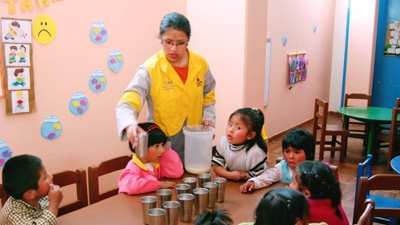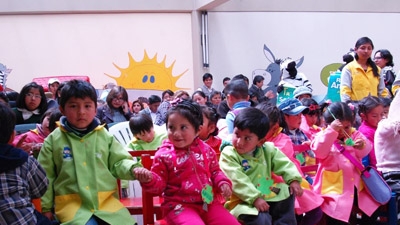Milenka Peralta has a stand at the Lanza Market in La Paz. Just over two years ago, she had a terrifying experience when her two-year-old daughter got lost among the market’s many shops and passageways. After nearly going crazy, she finally found her the next day thanks to a friend.
Today Marisol is four years old and goes to a daycare center located in the market, just a few steps from where her mother works. Marisol is one of 2,252 children aged six months to four years who attend the 66 ADEPI (Early Childhood Care and Development) centers operating in the seven macro-districts of La Paz.
“This daycare center is a blessing; it fits like a glove for women street sellers and also for other low-income families in the neighborhood. Without it, we would have to keep our children at the stand; here they are safe” said Milenka.
Private daycare centers have nothing over ADEPI facilities, which have appropriately equipped rooms for the children’s comfort (equipment for improving psychomotor development, modern teaching materials for the different learning levels) and nutritious food that assures children’s healthy growth. The monthly cost per child is between US$ 7 and US$ 12, as compared with an average of US$ 100 for a private daycare center.
Tania Nava, director of generational and gender issues at La Paz Municipality, said: “We want children from low-income families to benefit and thus to reduce the inequality gap with private daycare centers. It is also a workplace for women of the municipality, teachers and nurses, [and provides] training for pre-school teachers in keeping with international standards, such as the number of children per teacher, for example.”
Many of these children’s parents have informal employment or are looking for regular work. Many are single mothers who have experienced domestic violence.
“We work with [children who have been exposed to] high levels of domestic violence, which is generally perpetrated by the father on the mother or by the father on the children. Given this context, community participation is important for creating co-responsibility in the care of children” said Matilde Cajías, ADEPI coordinator at La Paz Municipality.
This initiative is also implemented in the City of El Alto, which has 80 ADEPI centers serving 4,105 children in nine macro-districts.
“The ADEPI project will benefit 3,800 families in El Alto with comprehensive health care and nutrition and especially protection of mothers and children” says Patricia Copa, ADEPI coordinator at El Alto Municipality.


